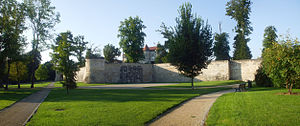Battle of Saint-Dizier
| Battle of Saint-Dizier | |||||||
|---|---|---|---|---|---|---|---|
| Part of War of the Sixth Coalition | |||||||
 Castle of Saint-Dizier |
|||||||
|
|||||||
| Belligerents | |||||||
|
|
|
||||||
| Commanders and leaders | |||||||
| Napoleon I | Ferdinand Wintzingerode | ||||||
| Strength | |||||||
| 30,000-34,000 | 10,000, mostly cavalry | ||||||
The Battle of Saint-Dizier was a battle during the War of the Sixth Coalition, fought on 26 March 1814, and is notable as Napoleon's last victory before he abdicated.
Blücher and Schwarzenberg agreed to attack Napoleon from both sides with all their united forces, and thus, if possible, to put an end to the war with one blow. Blücher, therefore, marched from Rheims to Châlons, Schwarzenberg from Arcis-sur-Aube to Vitry, in search of Napoleon: instead of falling back before him at some distance from one another, and thus giving Napoleon plenty of room, as he had expected, they boldly formed a junction of their several divisions behind him. The Allies hoped that Napoleon might turn back when he found his expectations foiled, and that they would then fight him in the great plains between the Marne and the Aube, where the Allies could make use of their numerical superiority in cavalry against the very inferior French cavalry. But Napoleon was already on his way to Saint-Dizier, and had only left a small division behind him, which occupied the villages along the road, close to Vitry.
On 24 March Schwarzenberg reached Vitry, meeting the King of Prussia and Tsar Alexander there. It was decided to march with the united force towards Paris and to leave the pursuit of Napoleon to the cavalry and horse artillery of General Wintzingerode, who was to harass Napoleon's troops. Taking into consideration all the circumstances of the case, it is impossible not to praise it for great boldness. Napoleon had nothing but chosen troops with him, and could form a junction with the numerous garrisons in his fortified towns. Maison, in the Netherlands, had already joined his forces to those of Carnot, who was then threatening Brussels, and might at any moment render assistance to Napoleon. Behind the Allies the whole country was in a state of insurrection, which would naturally be increased by the approach of Napoleon. Marshal Marshal Augereau was at the head of numerous forces at Lyon, and could send troops from thence. Meanwhile, the Allied armies, plunged deeper and deeper into the heart of France, were separated from the sources whence they drew their supplies; the Allies were in the midst of a desolated country, without any point upon which they could fall back for their supplies or support, and were shortly about to appear before the capital of the kingdom, the population of which were perfectly capable of giving employment to, and even destroying, a whole army. All this was sufficient to excite the greatest anxiety; but in their determination the allies clearly took the right course, even had the results been less successful. Paris and Napoleon had now lost the importance which they mutually gave to one another.
...
Wikipedia
